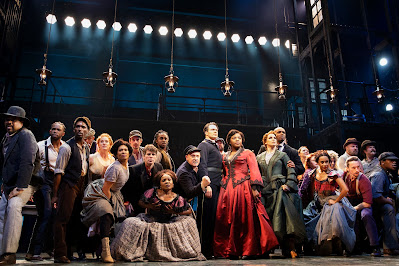By Harry Forbes
Early critical reaction to this epic Civil War-era musical set in New York’s seedy but racially vibrant Five Points district in Lower Manhattan has been rather mixed, but flawed or not, I found it an impressive piece of musical theater with an interesting plot and chock full of talent.
The show premiered in 2019 at the Berkeley Repertory Theatre, and was based on an earlier musical “Hard Times” by Larry Kirwin performed in 2012 and 2014 at The Cell in Manhattan.
With a generous cast of 40, and an imposing tenement set by Allen Moyer, the book -- co authored by Christina Anderson, Craig Lucas and Kirwan -- centers on a flictional saloon/brothel run by Nelly O’Brien (Joaquina Kalukango), a black woman married to Irish policeman Willie (Matt Bogart) who’s about to go off to fight in the war. (In the Five Points, apparently, interracial marriages were common with free-born blacks and escaped slaves living in harmony with Irish immigrants.)
Willie’s feisty sister Annie (Chilina Kennedy) is, for her part, married to a black Methodist preacher (Nathaniel Stampley), who aids escaping slaves who have come up north on the Underground Railway. One such fugitive is Washington Henry (Sidney DuPont) who resists the preacher’s admonition to continue to safety in Canada until he can be reunited with his love Angelina (Gabrielle McClinton). Nelly agrees to take him in.
At the same time, Annie’s nephew Owen (A.J. Shively) arrives from Ireland also seeking shelter, and finds himself sharing a room with Washington.
The villain of the piece is politico Frederic Tiggens (John Dossett) who is hellbent on breaking up the Five Points, and the political clout that an Irish-Black alliance might exert. An unwitting accessory to Tiggens’ scheming is the alcoholic piano player (Jacob Fishel) whom Nelly hires. A more proactive trouble maker is “Lucky” Mike Quinlan (Kevin Dennis) who has come back wounded from the war, and then resents the lack of job opportunities, especially when rebuffed by his former friend, the Reverend.
There’s a lot of plot here, but under Moises Kaufman’s accomplished direction, most of it is absorbing, at the same time that much of it is conventional and predictable.
Jason Howland’s score (lyrics by Nathan Tysen and Masi Asare) is not especially memorable on first hearing, but certainly more than serviceable, and there are some pearly moments such as Owen’s plaintive “Why Should I Die in Springtime,” as he fears the draft lottery that may soon drag him into the war, followed by the black ensemble’s “I’d Be a Soldier,” in which the Reverend and Washington sing about how their people are not allowed to fight.
Howland’s orchestrations are lush and, though the music is generally in a contemporary vein, includes some period instruments.
Nelly’s eleven o’clock number “Let It Burn,” sung as the Five Points is on the brink of destruction, is the show’s electrifying musical highpoint, and Kalukango sings it magnificently bringing the audience to its feet, and is no doubt a major factor in her multiple nominations in the various awards competitions.
Along the way, there’s lots of dancing -- superbly choreographed by Bill T. Jones -- variations on step dancing for the Irish characters and jazzier moves from the black characters. Ultimately, a dance competition at the saloon pits Washington against Owen, both desperate for the $300 prize money. Both DuPont and Shively prove mightily impressive here.

The cast is outfitted in Toni-Leslie James’ handsome period costumes. And there’s superior work by Donald Holder (lighting), Jon Weston (sound), and Wendall K. Harrington (Projection Design).
The longish first act seemed to climax at least two or three times before intermission, but I’m not sure what I'd want to cut. In any case, the packed audience at my performance sat transfixed through it all. And the roaring ovation at the end confirmed their seal of approval.
Kirwin’s additional music is said to be inspired in part by the songs of Stephen Foster which played a more major part of his earlier “Hard Times.” No spoilers here, but let me just say that Foster himself doesn’t figure any too nobly in the story. But then, the real Foster’s time in New York where he died (a possible suicide) is shrouded in mystery.
The show sparked my interest in learning more about the Five Points, and even about Foster himself whose beguiling music has been on my sound system's playlist ever since. (I do rather wish more of it had been retained here.)
The show’s 10 Tony nominations speak to its undeniable quality, suggesting that the show may override the critical carps and emerge a popular hit.
(Ethel Barrymore Theatre, 243 West 47th Street; 212-239-6200 or Telecharge.com)
Photos by Kevin Berne:
(Top) At center, Kevin Dennis, Matt Bogart, Joaquina Kalukango, Chilina Kennedy, Nathaniel Stampley and the company
I(Below) Sidney DuPont as Washington Henry, A.J. Shively as Owen Duignan and Ensemble

No comments:
Post a Comment